© 2014-


Radio Invicta - History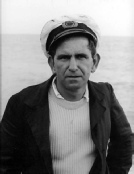

Radio Invicta was launched by a consortium of three men -
The station was based Red Sands Fort off Whitstable in the Thames Estuary, an ex-
Radio Invicta’s broadcasts were aimed at Kent, Essex and London and test transmissions were first reported to have taken place on 3rd June 1964, and continued for the next few weeks using various frequencies in the medium waveband. By the time regular programmes started on 17th July 1964 the station had settled on a frequency of 985kHz (306m), but the transmitter power was always low, only about 750 watts.
Radio Invicta's format had a bias towards middle of the road, easy listening music and proved popular with a dedicated audience in the station's small reception area, because it provided a musical alternative to the other pop based offshore stations on the air at  that time.
that time.
The station was promoted in publicity material as "The Good Music Station" and programmes carried titles such as " Date with Romance", "Memory Lane" (largely using old 78rpm records) and "Pot Luck" -
An announcement was made in October 1964 that the station would soon start to broadcast 24 hours a day, although this plan was never implemented.
Radio Invicta had difficulty attracting advertisers and carried very few commercials. Ironically it was Tom Pepper's desire to obtain more advertising revenue that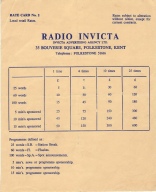 led to tragedy for him and ultimately spelt the end of the station altogether.
led to tragedy for him and ultimately spelt the end of the station altogether.
Early in December 1964 Tom Pepper approached the mass circulation Sunday newspaper, News of the World, which at that time was advertising quite extensively on Radio Caroline, asking it to consider also buying airtime on Radio Invicta. The News of the World agreed to one trial commercial being broadcast on 19th December 1964 and indicated that if found to be satisfactory there was a possibility it would purchase further airtime.
Tom Pepper considered this offer from the country's biggest circulation newspaper to be a major breakthrough for his struggling station and wanted his Senior Announcer and Programme Director, Ed Moreno, to voice the live commercial. Moreno was on shore leave at the time, but Pepper persuaded him to return to the Red Sands Fort to prepare for the commercial's transmission.
The two men left Faversham harbour in the station's 'tender', the 36' long David, early in the morning of 16th December 1964. After Ed Moreno, together with some fresh food supplies, had been transferred to the Fort, DJs Simon Ashley and engineer Martin Shaw joined Pepper in the David for the return journey and some welcome Christmas shore leave.
At about 6.00pm the same day a police launch came to the Red Sands Fort and reported that Tom Pepper's body had been found near Reeves Beach, Whitstable, tied to a small wooden life raft. Ed Moreno was asked by the police to leave the Fort and formally identify Pepper's body, but before doing so he hurriedly recorded a tribute to his former boss which was aired on the station the following day. More wreckage and oil drums were later found floating in the sea near the Street Buoy, but of the three men on board the David that day only one other body was ever recovered several months later and identified from a tape recording of a Radio Invicta programme found in a pocket of the clothing.
A coroner's inquest into the death of Tom Pepper (Harry Featherbee) was held on 22nd December 1964, when an open verdict was recorded. The East Kent Coroner said he was not satisfied about the sea worthiness of the David and advised that there should be some sort of direct radio communication be established between the Fort and the station's landbase.
For months after this incident much rumour and speculation surrounded the circumstances of the death of the three men on board the David. In the immediate aftermath of the tragedy Pepper's widow Francoise Featherbee and his former partners Charles Evans and John Thompson continued to operate Radio Invicta, but there were many disagreements about ownership and station policy and on 11th February 1965 Radio Invicta quietly closed.
POSTSCRIPT
The wreck of the David was eventually recovered by divers some six months later, in June 1965.

Pot Luck requests and advertising announcement

Tom Pepper

Click on picture to enlarge
Radio Invicta’s second Advertising Rate Card
(Click to enlarge)
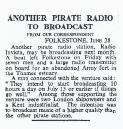
The Times
29th June 1964

The Guardian
18th December 1964
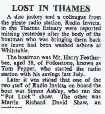
The Times
18th December 1964
Radio Invicta test transmissions requesting reception reports, June 1964

A Facebook page has been established up to commemorate this tragedy.
Click on the Facebook logo to visit the page


History
Key Dates
Fort and Location
Technical
Staff
Programmes





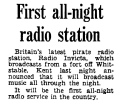
Daily Mail
6th October 1964

The Times
18th June 1965




Back to Britain Gallery


Back to Radio Invicta
